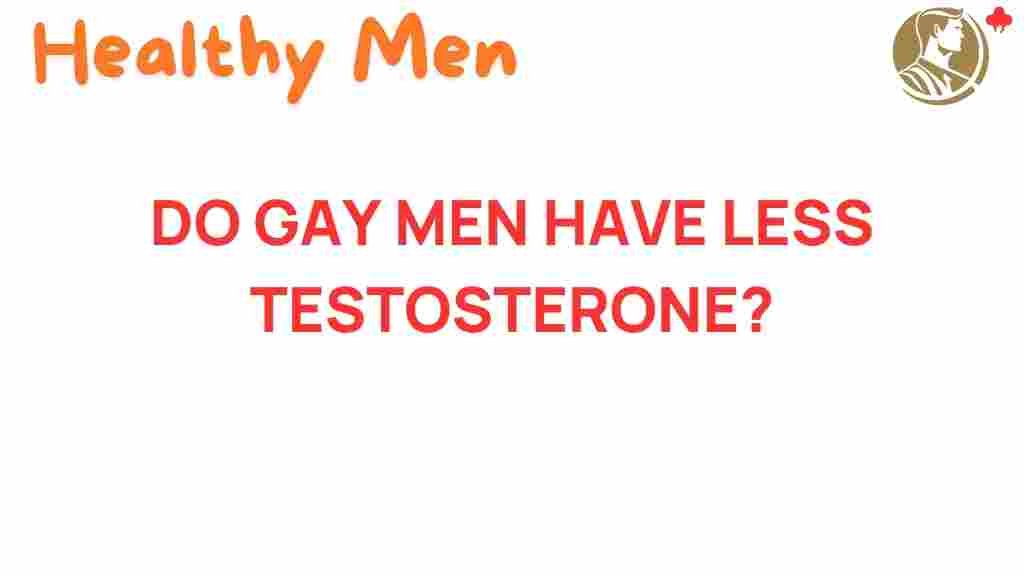The Testosterone Debate: Do Gay Men Have Lower Levels?
Testosterone plays a crucial role in various aspects of health, influencing everything from physical strength to mood. In the context of LGBTQ+ health, the relationship between testosterone levels and sexual orientation has sparked considerable debate and research. This article delves into the science behind testosterone levels in gay men, examining current findings, health implications, and the broader context of sexuality and hormonal health.
Understanding Testosterone and Its Importance
Testosterone is a hormone primarily produced in the testes in men and in smaller amounts in the ovaries in women. It is responsible for:
- Development of male physical characteristics
- Regulation of libido
- Bone density
- Muscle mass and strength
- Mood and cognitive function
Maintaining balanced testosterone levels is essential for overall health, and deviations can lead to various health issues. This is particularly relevant when discussing testosterone levels in gay men and how these might differ from their heterosexual counterparts.
Current Research on Testosterone Levels in Gay Men
Several studies have explored whether gay men have lower testosterone levels compared to heterosexual men. The findings have been mixed, indicating that there is no clear consensus in the scientific community. Some studies suggest that testosterone levels may be influenced by sexual orientation, while others find no significant differences.
For example, a study published in the Journal of Sexual Medicine found that sexual orientation did not significantly correlate with testosterone levels among men. Similarly, another research piece indicated that lifestyle factors, rather than sexual orientation, might play a more substantial role in determining hormone levels.
Factors Influencing Testosterone Levels
Testosterone levels can be affected by various factors, including:
- Age: Testosterone levels naturally decline with age.
- Body composition: Higher body fat percentages can lead to lower testosterone levels.
- Fitness level: Regular exercise can boost testosterone production.
- Stress and mental health: Chronic stress can negatively impact hormone levels.
- Medical conditions: Certain health issues can affect testosterone levels.
These factors are essential when considering the testosterone debate among gay men, suggesting that individual lifestyle choices and health conditions may be more decisive than sexual orientation itself.
The Role of Lifestyle in Hormone Levels
For gay men, like any other group, lifestyle choices can significantly impact testosterone levels. Here are some lifestyle factors that can influence hormone health:
- Diet: A balanced diet rich in nutrients supports hormone production.
- Exercise: Regular physical activity, particularly strength training, can elevate testosterone levels.
- Sleep: Quality sleep is crucial for maintaining healthy hormone levels.
- Substance use: Excessive alcohol and drug use can lower testosterone levels.
Health Implications of Testosterone Levels
Low testosterone levels can lead to various health issues, including:
- Decreased libido and sexual dysfunction
- Fatigue and decreased energy levels
- Loss of muscle mass
- Increased body fat
- Depression and mood swings
For gay men, these potential health implications highlight the importance of monitoring and maintaining healthy hormone levels. Engaging in regular health screenings and consultations with healthcare providers can be beneficial.
Addressing Myths and Misconceptions
The conversation surrounding testosterone and gay men is often clouded by myths and stereotypes. It’s important to clarify these misconceptions:
- Myth 1: Gay men have inherently lower testosterone.
Truth: Research does not conclusively support this claim; individual health factors are more significant. - Myth 2: Low testosterone is solely a result of sexual orientation.
Truth: Lifestyle, age, and health conditions play a larger role. - Myth 3: Testosterone replacement therapy is unnecessary for gay men.
Truth: If low testosterone is diagnosed, treatment should be considered regardless of sexual orientation.
Finding the Right Approach to Hormone Health
To ensure optimal testosterone levels, individuals should consider a holistic approach to health. Here are steps to enhance hormone health:
1. Regular Check-Ups
Consulting with a healthcare provider for regular check-ups can help monitor testosterone levels and overall health.
2. Balanced Diet
Incorporate foods rich in zinc and vitamin D, which are essential for testosterone production:
- Lean meats
- Nuts and seeds
- Leafy greens
- Fish
3. Exercise Regularly
Engaging in both cardiovascular and strength training exercises can positively influence testosterone levels.
4. Manage Stress
Practicing mindfulness, yoga, or meditation can help reduce stress, which is beneficial for hormone health.
5. Adequate Sleep
Aim for 7-9 hours of quality sleep each night to support overall hormone balance.
Supportive Resources for LGBTQ+ Health
Finding supportive resources is vital for the LGBTQ+ community. Here are some organizations and resources that focus on LGBTQ+ health:
Conclusion
The debate surrounding testosterone levels in gay men is complex and multifaceted. Current research indicates that while lifestyle factors significantly influence hormone levels, sexual orientation alone does not determine testosterone levels. Understanding this relationship is crucial for promoting health within the LGBTQ+ community.
By focusing on holistic health practices, addressing myths, and seeking regular medical advice, gay men can maintain healthy testosterone levels and overall well-being. The importance of informed discussions and scientific research cannot be overstated, as they pave the way for better health outcomes and understanding within the LGBTQ+ community.
In conclusion, whether you identify as gay or belong to any other sexual orientation, prioritizing hormone health is essential for a fulfilling and healthy life.
This article is in the category Conditions and created by healthymen Team
